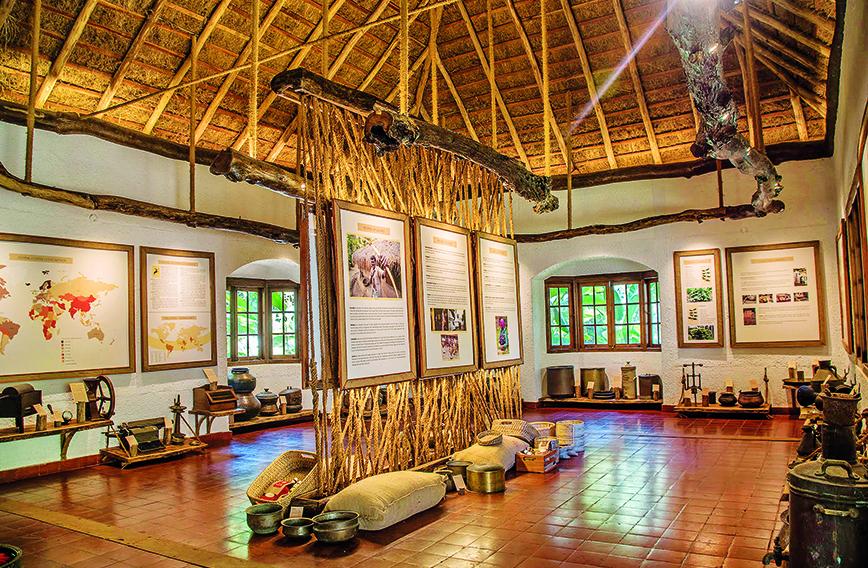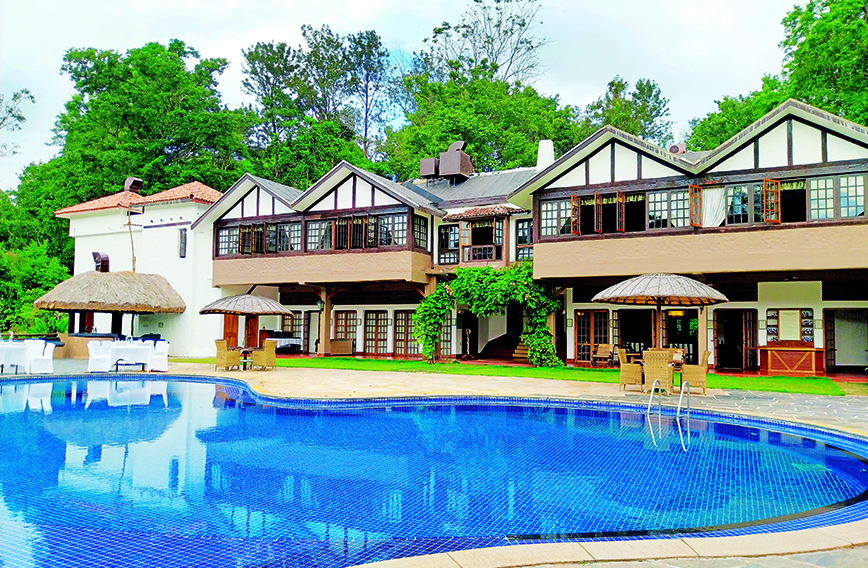
The Sidapur Museum of coffee where you can brew your own cup
Getting a whiff of Coorg and its coffeeology
Susheela Nair
SNUGGLED in the midst of 300 acres of verdant coffee and spice plantations in a picturesque pastoral setting, Evolve Back Resort in Kodagu has catapulted Kodagu onto the national tourism map. The luxury brand has ventured into the holiday hospitality business in this region. Owned by the Ramapuram Group, which has been in the plantation business since 1921, the resort is renowned for its beauty, facilities and hospitality.
In keeping with its avowed philosophy of offering exquisite, true-to-the-land experiences, the resort allows guests to sample plantation life at its graceful best. This is made possible by the traditional-style accommodation, and the host of facilities that the resort offers. The wide choice of accommodation includes Kodava-style Ayenmanes with private pools and plantation cottages. An Ayurveda spa, a gym, a conference hall, an infinity pool and three restaurants —Peppercorn, Plantation Leaf and Granary — are also on offer.
Boating in a four-acre private lake, guided plantation tours, coracle rides, birdwatching, cycling, and visiting the resort’s own school are some of the activities arranged for guests. We returned with memories of straight-from-the-heart service, pampering, privacy, tranquility and a multitude of enjoyable experiences firmly rooted in the natural environs and culture of the land.
At the Sidapur Museum of Coffee and Culture we experienced the thrill of making our own brew right from pulping, grading, roasting, grinding and cupping in. With the invigorating aroma of coffee in the air, we strolled around the museum and got a taste of how life was lived in the old days in Coorg. We found Coffeeology, a daily live session on the art and science of gourmet coffee, most interesting.
The museum offers different sections that showcase the story of the Ramapuram family, the history of coffee in Coorg, how coffee is cultivated globally and the art of brewing the perfect cup. It recreates a space evoking the rustic feel of a coffee plantation, with materials and objects used in the past and the present, reminiscent of eras gone by and ways of life that have been replaced with the onset of modernity.
Large, dented copper and brass vessels of unique shapes and sizes line the walls, each harbouring their unique stories. A few of the objects are from the Ramapuram family collection — a hand-operated coffee roaster and a typewriter that were very much in use on the Chikkana Halli Estate. The coffee grinder in the museum has had quite a journey. It belonged to a Kodava gentleman who ran a coffee house in Lahore before the Partition, after which it was transported to Bangalore and housed in Chinny’s Café on Brigade Road for many years.
 The Granary restaurant which overlooks an infinity pool
The Granary restaurant which overlooks an infinity pool
Steeped in local lore and legend, the resort prides itself on locally inspired activities and initiatives which include school adoption, cultural shows by local artistes, providing them with a supplementary means of income, and schoolteachers’ training which demonstrate that responsible tourism is not a one-way street. Right from the native and eco-friendly architecture to the locally inspired activities and interaction with ethnic communities, the entire experience is life-enriching.
In keeping with its eco-friendly ethos, concerted efforts are made to conserve water. The cornerstone of the resort’s water conservation programme is the hotel’s own sewage treatment plant (STP). The treated water is used for irrigation in the gardens at the resort’s premises. The STP not only preserves the quality of fresh water resources, but reduces the amount of water used by the hotel. An extensive drip irrigation system allows the resort to use less water. A reverse osmosis plant installed in each cottage provides 100 percent safe drinking water while reducing the negative impact of over 50,000 plastic bottles every year. Other commendable water conservation programmes of the resort include rainwater harvesting and the ozonisation plant for the main swimming pool.
The resort’s solid waste management efforts are noteworthy too. Apart from the segregation of degradable and biodegradable waste, plastic, glass, metal and paper are sent for recycling. STP sludge is used as fertilizer. The use of CFL lamps, electronic key tags, and installation of governors on diesel generator sets have helped in conservation of energy. A company-owned wind power generator offsets power consumption and supplies surplus power to the government.
No tree has been cut down during the construction and the enormous ficus tree next to the pool has been there since before its inception. The landscape is beautifully laid out with indigenous flowering shrubs and plants. It is difficult to find exotic flora in the resort. All the trees and plants are named and this makes for an enjoyable and informative walk. Steps have also been taken to minimize formal landscaping.
With green consciousness catching on, travellers are heading to resorts with excellent responsible tourism bona fides. Currently, local employment at the resort has been stepped up. The resort shows its concern for the community by organizing structured community development programmes. Cultural shows are carried out by the locals, providing them supplementary income. The indigenous guides and staff are the faces of the resort’s claim to fame. These signature holidays which preserve the purity of nature and culture of the land have received due global recognition and prestigious awards. At the end of the stay, even a casual visitor will be converted into a sustainable tourism practitioner.
Fact File
Getting there: Distance from Bengaluru — 230 km
Distance from Mysuru — 100 km
Email: coorg@evolveback.com
Comments
Currently there are no Comments. Be first to write a comment!




